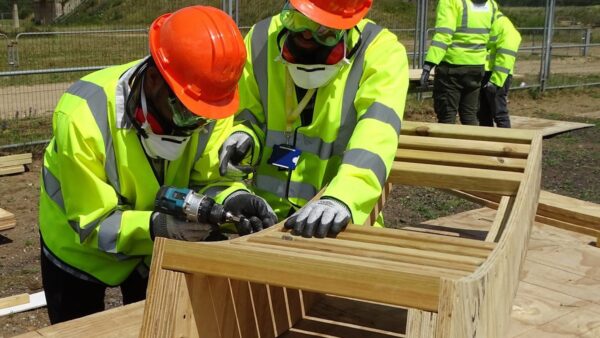Construction has an aging workforce, so you may sometimes find yourself managing someone older and more experienced. Should these workers be managed any differently? By Dave Stitt

In the last year I’ve had the privilege of working with young construction professionals through my Coach for Results course, which teaches the basic techniques of a coaching style of management.
Instead of giving orders and monitoring compliance, a coaching style puts the onus on the people you manage to own their accountabilities and get the results you all want and need.
The young people are loving it. They see the benefits of the coaching style, and it’s the way they want to manage and be managed themselves. They and I believe a coaching management culture will help companies recruit and keep good talent and boost productivity.
But an interesting concern emerged. One participant seemed to speak for others when he volunteered that he liked the coaching style when managing people younger than him, but not so much with those who were older. With older people, he found himself resorting to the default command-and-control style. “Because,” he said, “that’s what they want and I’m not confident around them.”
I understand this. Coaching techniques are not difficult, but it takes a bit of practice to master them in a live work setting. Soon, though, it becomes second nature and the person you’re managing won’t notice that you’re using any particular style at all, whatever the age difference. They’ll just experience you as a normal, polite and humane person and that working with you is enjoyable and productive.
But with construction’s rapidly aging demographic, the topic of managing older people generally seems to be a relevant one, so I teamed up with a coaching colleague, Alex Atherton, who was a head teacher for many years managing staff both younger and much older, to see if we could come up with some tips. Here they are.
1. Relax
Don’t worry about older staff resenting you for becoming their boss. They’ve been around, know how it works and are quite likely content with their station in life – if they were not, and felt they ought to have got your job, they’d have gone for it.
They won’t expect you to match their experience or be a perfect manager. They’ll want you to work hard and show some humility where appropriate. They’ll have had plenty of other managers to compare you with, and will know that quality doesn’t always come with age.
In fact, you might be surprised at how others enjoy feeling part of your success as you climb the ranks. They like seeing a team leader with whom they’ve had a good experience gain recognition and responsibility.
2. Use their experience
Ask for their opinion when a tricky problem needs solving, or when you need ideas. This is a basic coaching technique (more on this below). Most people like to be asked because it makes them feel valued and involved.
It’s no admission of inadequacy to ask; you got the job because of your skills and attitude, not because you’re the most experienced hand, so getting regular feedback from the team is a big part of your job.
3. Understand your role
Distinguish between your job and their job. As a manager, your job is to make sure things get done, not to do everything.
One way of looking at it is that they work in the team while you work on the team.
People usually get promoted in construction because they’re good at the technical role they have, and it can be difficult to let go of that. I see many older managers who dive into their people’s technical problems because that’s their comfort zone. They see themselves as ‘chief problem solver’. As a result, they’re working two or three pay grades below their own.
Younger managers should find it easier not to fall into that trap, and to focus instead on creating the right conditions for everyone to succeed – and then to get out of the way.
Remember, you got promoted to this position for a reason, so get clear on that and build on it.
4. Make the team work
Working on the team means cultivating great chemistry, which I define as an atmosphere of trust, engagement, commitment and energy.
It’s “people stuff”, which construction ignores at its peril. We tend to think construction is primarily a technical industry when, in fact, it’s primarily a people one.
I believe we know what great chemistry looks like. People pull together to achieve a clearly defined common goal, and everyone trusts each other to do the right thing in support of that goal. They talk to each other frankly so that information flows to where it’s needed, when it’s needed. Everyone’s on high alert for anything that might jeopardise the result, and they take timely and concerted effort to eliminate the risk. There is an esprit de corps of learning lessons and moving forward briskly; no one’s that interested in blame and recrimination. The atmosphere is polite, open, welcoming and friendly.
As manager, you set the tone. Be polite. Say thank you. Praise effort; give a lot of feedback, and not just when things go wrong. Encourage honest discussion and ask people to participate. Listen carefully. This makes people feel valued, whatever their age, gender, background or skin colour.
5. Yes, coach them
When you coach as a manager, you focus on the other person’s potential rather than their current performance, and you encourage new thinking on their part about how to achieve the results they want.
If they come to you with an issue, instead of telling, suggesting and advising, you ask them, ‘What do you think?’. It’s not a brush-off; you’re genuinely interested. If they’re used to being told what to do they might be taken aback at first, but if they see that you mean it, they’ll start to think about what they think, and tell you what they’re thinking.
As they talk, you feed back to them what you notice and ask follow-up questions to encourage more thinking. This creates a psychologically safe space for them to work out what to do, which taps into powerful motivators such as one’s sense of autonomy, mastery and making progress on meaningful work. Older workers, who are walking treasure troves of skills, experience and tacit knowledge, will especially appreciate this.
Dave Stitt FCIOB is a chartered engineer and coach of executive and project teams. His book, ‘Coach for Results: Empower your people to achieve the extraordinary’, is out now on Amazon. The next Coach for Results course starts 2 November at the CIOB Academy.











